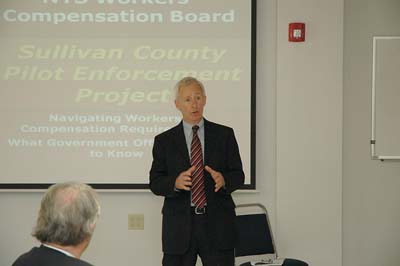By Dan Hust
WHITE LAKE — Roscoe contractor Pat Murtagh’s efforts paid off on Wednesday, when state business advocate and fellow Sullivan County resident Neil Gilberg kicked off a pilot “enforcement project.”
Murtagh has long pushed for better regulation of the contracting industry in the county, which suffers from game-playing charlatans who rip off both homeowners and their own employees.
The idea, said Gilberg, is to coordinate his office’s enforcement efforts – the NYS Workers’ Compensation Board – with area police and building inspectors in order to catch contractors in the act of flaunting workers’ comp rules.
Oftentimes, by not paying workers’ comp insurance as required by law, disreputable contractors can still gain plenty of work because they can lower their prices substantially, underbidding legitimate competitors by tens of thousands of dollars.
“We want to make sure there’s a level playing field out there for all the contractors,” Gilberg said.
And if there is an injury on a work site without proper workers’ comp in place, the property owner can be held liable – ignorance not being an acceptable excuse.
Sullivan County Chamber of Commerce President Terri Ward, who hosted Wednesday’s training seminar in White Lake, said the pilot program evolved from an ultimately unmet desire for licensing local contractors.
“[This is to] educate, mediate and enforce the workers’ compensation requirements ... so people in Sullivan County don’t have to face these issues,” she explained.
Thus upwards of a dozen Sheriff’s deputies, Fallsburg police officers, and area township code enforcement officers learned how this model program will work – one Gilberg hopes is successful enough to be picked up statewide.
A variety of Gilberg’s state colleagues explained the idea:
• Building inspectors and code enforcement officers will be on the front lines, tasked with noting workers’ comp. violations and reporting them immediately to the NYS Workers’ Compensation Board. The state hopes the inspectors will also issue immediate “stop work” orders.
• The state will then contact the local police agency to investigate.
• The police will, if possible, immediately visit the work site and take down info on the number of employees and vehicles, interview workers, and gather pictures of the site and business cards. That info will be given to the state for possible prosecution of the employer(s) by the District Attorney’s Office.
Some of the code officers present, however, were dubious.
“We issue the ‘stop work’ order and they continue to work,” Bethel’s code enforcement officer, BJ Gettel, lamented to the state, drawing on her own experiences. “Our hands are tied.”
Town of Liberty Code Enforcement Officer Mark Van Etten added that such an order likely means the employer and his/her crew will quickly scatter and disappear to avoid prosecution.
“You’re not going to find these people in an hour,” Gettel agreed.
Gilberg said one of the main goals of the pilot program is to respond far quicker than any of the state’s 45 investigators ever could, especially in a rural county such as Sullivan.
The police, he stated, will be key in ensuring that immediate response.
Sheriff’s Patrol Chief Art Hawker, who was in attendance, remarked afterwards that it will be dependent on available manpower, but he’s willing to give it a try.
“I think it’s worth making the attempt,” he acknowledged.
Cops won’t have to testify if the matter stays in civil court, officials added. (Contractors can be charged with a felony if six or more employees are working without workers’ comp.)
Van Etten suggested the state go after the day laborers who are violating the law, as well, but officials said that’s a Dept. of Labor issue, not the Workers’ Comp Board.
“The gameplay sounds great,” Gettel observed, noting only about four of the county’s 20 building inspectors were present. “The reality is, it will be interesting to see if this works.”
Gilberg was confident it will, though he said he’ll review the progress in six months.
“Once we’re doing it, it will be a win-win,” he promised.
For more information on the pilot program, contact Gilberg at 518-486-3331 or neil.gilberg@wcb.state.ny.us.



